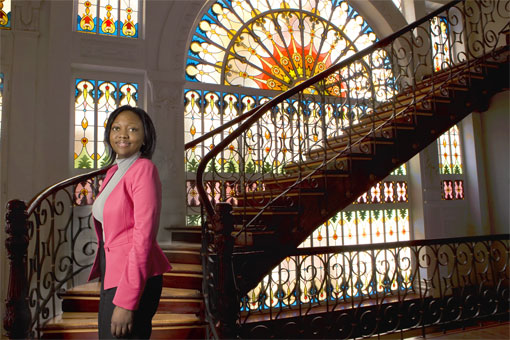Young people have the challenge—and the responsibility—of changing the world. I believe we are living through a special moment today that I like to call “the globalization of diversity.” Communities and citizens everywhere are starting to welcome cultural, racial and ethnic differences, rather than see them as weaknesses.
In Colombia, we are experiencing the same process—and young people like me are taking the lead in welcoming diversity. As minister of culture since June 2007, and as my country’s first-ever female Afro-Colombian minister, I see my own responsibility as building a stronger, more inclusive country. My mission is helped by the fact that today, diversity has become synonymous with self-determination and creativity. If properly understood and managed, it is the basis for social cohesion and a source of economic competitiveness.
The lack of recognition or understanding across community or cultural boundaries has always impeded nation-building. One way to illustrate this is with a concept developed in ancient Rome for the engineering of water supply systems. According to the so-called Hydrostatic Paradox, if one vessel loses liquid, all other vessels will be affected as well. Likewise, if one receives liquid, so do all other vessels. Put in modern terms, society requires that each of its parts be recognized and integrated in order to function as a whole. Acceptance of this principle is at the core of civilization. Another word for this is interdependence, which refers not only to nations, but to individuals sharing a territory, history and common destiny.
When I was appointed minister, some of my fellow citizens privately and publicly worried that I would be a “black minister for black people.” But one of my clear priorities was to send a message that all ethnic communities are equally respected and equally deserve inclusion in our society.
Since my appointment, I have developed a management approach entitled “Diverse Colombia: Culture from Everyone, Culture for Everyone.” This approach emphasizes that our diversity is our main strength and that culture comes not only from the elite but from all Colombians.
My personal, family and community experience with discrimination taught me that we cannot repeat history. We must move beyond discrimination to thrive as a nation. As our enslaved African ancestors did, we Afro-Colombians give our affection, hard work, love, and solidarity to society, even to the people who oppressed us.
In my time as minister, I have visited more than 150 of the 1,100 municipalities that make up Colombia. I have been in every state, from the Atlantic to the Pacific coasts. My travels have expanded the scope of the ministry and improved public access to services. For instance, the ministry’s materials and cultural programs are reaching 99 percent of libraries and 50 percent of music schools nationally. We have also launched two national programs dedicated to culture and have developed the first comprehensive, clear guidelines on how my ministry supports culture. One of the criteria for recognizing cultural contributions is that they must adequately recognize diversity and the different communities that make up the country.
These efforts are part of a larger national discussion that began decades ago. In the 1980s and 1990s, women and ethnic communities grew increasingly aware of their rights. This led to the establishment of those rights and the responsibilities to protect them in the constitution of 1990. And this led, in turn, to another national discussion about how ending inequality and discrimination can be a basis for ensuring peace and prosperity for every Colombian citizen. This is where the work of the current Ministry of Culture comes in.
When ignorance persists, so do discrimination and prejudice. Education is the only way to address this. In 2009, the Ministry of Culture, along with the National Prison Institute and other national agencies, launched an anti-discrimination education program. The aim was to build public awareness of diversity and tolerance through training programs and, in particular, to work with communities to document their stories. We envisioned a national effort to rewrite history books to reflect the plurality of culture, tradition and contributions of Colombian communities.
We want young people to play a major role in recasting our understanding of diversity in our societies. Culture is the cornerstone for this process, since cultural activities are the best means of engaging youth and imbuing them with respect for the values of all their fellow citizens, rather than perceiving differences as exotic or curious. We need to find new ways to participate, to represent ourselves and to be heard.
We have tried to do this in a number of ways in Colombia. Recently, we dedicated a national monument to commemorate the genocide of indigenous peoples in the Amazon. We established 2009 as the Year of Afro-Colombian Poets, highlighting and honoring past and present writers.
Recognizing and embracing diversity is not just a social project; it is essential for sustainable development. Prejudice and discrimination have reinforced inequality and thwarted our ability to construct the social fabric necessary for both broad-based economic growth and a more just society.
Colombia is one of the special countries whose diversity provides the basis for national strength and prosperity—if we can only recognize it as such. We have more than 80 indigenous groups, along with communities of African, Arab and Spanish heritage. We are as fortunate in our cultural variety as in the bio-diversity of our environment. If we can ensure that all of our cultural “vessels” get equal supplies of attention, support and respect, we will be well on our way to establishing a peaceful and more equitable society.



